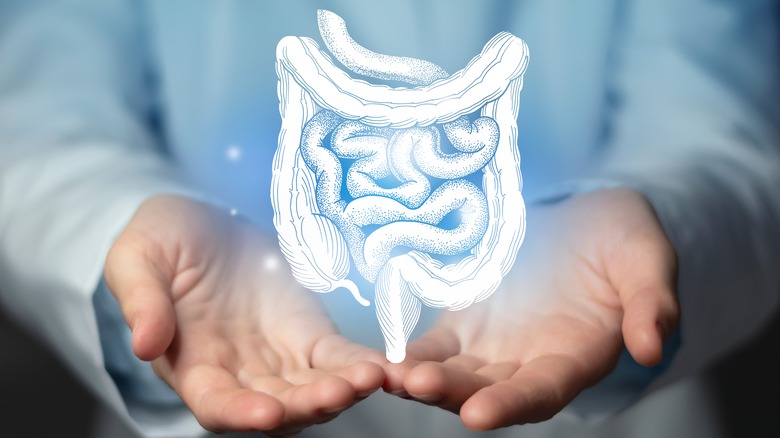What Happens To Your Body When You Are Malnourished
Malnutrition refers to an imbalance of nutrients in the body, per a 2022 paper in the British Journal of Nutrition. This can stem from the presence of an eating disorder like anorexia, a lack of caloric intake, or a scarcity of healthy foods. For some people, malnutrition develops out of an underlying disease or the complications that arise during the course of an illness. In such cases, the body may have difficulty absorbing enough nutrients from food.
A lack of nutrition is what usually springs to mind when we talk about being malnourished, but it can also manifest as overnutrition, according to a 2016 article in Trends in Immunology. When a person is undernourished, they're not receiving enough of the nutrients they need for their body to work properly. This can present as a deficiency of macronutrients like proteins, carbohydrates, and fats, or the micronutrients that come from vitamins and minerals. In cases of overnutrition, a person may be getting too much of certain nutrients, to the point that it's taking a toll on their health. An excess of fat, protein, or carbohydrates are usually packed away in the fat cells of your body's adipose tissue.
Malnutrition affects billions of people around the world. While there are effective treatments available, chronic malnutrition can sometimes lead to irreversible physical and mental health problems (via British Journal of Nutrition). Here's how being malnourished can affect different organs and systems of your body.
You may lose weight
One of the main visible signs of malnutrition is weight loss, notes the NHS. People who are undernourished can lose somewhere between 5% and 10% of their weight within three to six months. This is often observed in people with restrictive eating disorders such as anorexia, per an article in the Journal of Eating Disorders. It's also seen in those facing food insecurity who have a caloric intake below the minimum recommended energy requirements (via Our World in Data).
Around 8.9% of people around the world are undernourished. Many children in countries with high economic instability suffer from wasting, which is when an individual is dangerously thin for his or her height. This leaves them more vulnerable to developmental delays, diseases and infections, and even death, compared to the average person.
According to a 2017 paper in Annual Review of Nutrition, an imbalanced consumption of macronutrients (like proteins, carbohydrates, and fats) can ultimately deprive the body of energy. The body begins to break down its tissues and cells, starting first with its body fat stores. The wasting of fat and muscle is especially common in people with protein-energy undernutrition (PEU), per MSD Manual. For this reason, many people who have PEU become visibly emaciated. If starvation continues for a long period of time, they can end up losing more than 50% of their body weight.
The immune system shuts down
When your body isn't being sufficiently nourished, it lives in a constant state of "high alert," according to a 2016 paper in Trends in Immunology. This means that it isn't functioning in a balanced way, but rather running on empty. One of the first systems in your body to become compromised is your immune system, which is why people are more susceptible to infections and illnesses when they're malnourished.
The first 1,000 days of an infant's life is integral to the development of a healthy and well-functioning immune system. Children who are undernourished in early life, even in mild forms, develop defects in immune response. As a result, they have an increased risk of diabetes, high blood pressure, cardiovascular disease, and other health issues throughout most of their lives. They're also more likely to die of common infections.
Research shows that maternal malnutrition can influence a baby's immune development before conception. Malnutrition severely affects a child's gut bacteria, which plays an important role in metabolizing nutrients. In other words, poor gut health can further contribute to malnutrition, causing a vicious cycle. Breastfeeding is recommended in the first six months of an infant's life, particularly in developing countries, as it provides the baby with essential nutrients and immune factors.
Children can become stunted
Malnutrition in early life can cause stunting, reports the World Health Organization. This is when a child is too short for his or her age. Per 2016 estimates, 155 million children globally under the age of five are stunted due to malnourishment. Stunting affects almost one-third of children in developing countries, where there are more deaths resulting from pneumonia and diarrhea among seemingly healthy children with stunting than unhealthy children without stunting (via a 2016 paper in Trends in Immunology).
Stunting may stem from a combination of factors such as the child's poor diet, the mother's poor nutritional intake during pregnancy, and the impact of infections (per Our World in Data). Linear growth retardation, which is a precursor to stunting, can begin in utero and continue as a baby matures into childhood (via Paediatrics and International Child Health). Many women who were stunted as children go on to have stunted offspring, continuing the intergenerational cycle of ill health, which is why it's important for mothers to have healthy bodies before and during pregnancy.
Stunting can hold a person back from reaching their full potential both physically and cognitively (via Our World in Data). It can cause critical developmental delays that impact on health and learning. Unlike wasting caused by malnutrition, the effects of stunting are believed to be largely irreversible after the age of two. Recovery of some deficits might be possible, but these improvements need to occur in the first few years of life.
You can also gain weight
People often equate being undernourished with being emaciated. But it's possible to be malnourished and be an average weight or even overweight (via Nutrition Journal). In fact, malnutrition and obesity often coexist, particularly where people consume cheap refined carbohydrates and processed foods and drinks, which lack important nutrients.
Obesity is also prevalent among people who are exposed to hunger-related undernutrition, notes a study published in Reviews in Endocrine and Metabolic Disorders. Nutritional stunting in childhood can lead to impaired fat oxidation, causing a build-up of fat in the body, per research published in the American Journal of Clinical Nutrition. This may explain the high rates of obesity among malnourished individuals living in many developing countries.
A lack of micronutrients can have a negative impact on muscle development and maintenance (via Reviews in Endocrine and Metabolic Disorders). If you're not consuming a sufficient amount of vitamins and minerals, your body won't be able to build and sustain new muscles. Rather, your metabolism may slow down, and you will likely gain excess body fat instead.
It may lead to blood pressure problems
When your body is starved of food and nutrition, your heart rate and blood pressure can drop to a dangerous low, notes the Acute Centre for Eating Disorders and Severe Malnutrition. This is often seen in patients with anorexia. Their heart rate may decrease to less than 60 beats per minute, a condition known as bradycardia, while their blood pressure can drop below 90/60 mmHg. This happens when the parasympathetic nervous system attempts to preserve energy. A common cause of hypotension is a weakened heart muscle, which causes a reduced volume of blood flow. The heart is a large muscle after all, and muscle wasting is a prevalent symptom of malnutrition.
Bradycardia and hypotension can take a toll on the body in various ways, causing chest pain, fatigue, and dizziness (via Cedars Sinai). It deprives the body's organs of oxygen, including the brain. People with low heart rate and blood pressure may have a hard time thinking, concentrating, and remembering things. In rare cases, undiagnosed chronic bradycardia can give rise to cardiac arrest.
Interestingly, long-term exposure to malnourishment can also cause your blood pressure to skyrocket. Malnourished children were more likely to have elevated blood pressure compared to healthy children, according to a study published in Nephron Clinical Practice, including those who recovered from undernutrition six years earlier. Research has shown that adults who were undernourished as children have a higher risk of developing hypertension than those with adequate nutrition (via BMC Public Health).
Your stomach can become swollen
According to research, undernourishment can bring about two different types of protein-energy malnutrition (PEM): Marasmus and kwashiorkor (via Microbial Pathogenesis). The latter is responsible for a swollen abdomen, which is commonly seen in children who are severely malnourished.
Protein is a critical macronutrient, per a paper in BMJ Case Reports. Without it, the body lacks the energy it needs to drive important metabolic processes. One of these processes is your lymphatic system, which is responsible for flushing out cellular waste and toxins from the tissues into the bloodstream (via EBioMedicine). A protein deficiency slows down and disrupts this important function in your body, resulting in the build-up of fluid in your tissues and gut, also known as edema.
Over time, kwashiorkor can lead to a distended belly (via BMJ Case Reports). It can also cause your liver to become enlarged or inflamed with fatty infiltration. The condition usually affects children and infants, and is widely recognized among those living in developing countries with famine and drought. It can also occur in patients with severe anorexia or other restrictive eating disorders. Other common symptoms of kwashiorkor include a loss of muscle mass, frequent infections, stunted height, brittle hair that easily falls out, and inflamed patches of skin that darken or crack. If left untreated for a long time, kwashiorkor can become fatal.
Your muscles start to waste away
When your body is lacking important nutrients like protein, your muscles gradually start to break down and waste away, also known as muscle atrophy (via Clinical Nutrition). Muscle decay can be a natural part of the aging process for some people. However, malnutrition -– in particular, protein-energy deficiency -– is a contributing risk factor for progressive loss of skeletal muscle mass and strength. A sufficient amount of protein is necessary for normal muscle development and function.
Severe undernutrition can lead to muscle wasting diseases, such as sarcopenia, which is characterized by an involuntary loss of skeletal muscle mass (via BioMed Research International). Although sarcopenia is an age-related condition, a lack of protein, vitamins, and minerals can significantly speed up its onset and development.
Research shows that geriatric patients with lower muscle mass and strength have a higher risk of malnutrition (via Nutrients). A poor nutritional intake combined with a lack of physical activity can quickly exacerbate muscle atrophy in older people, as well as having a detrimental impact on their ability to build strength over time. Essential amino acids (EAAs) are important building blocks for protein synthesis, which is why it's recommended that older people consume protein sources that are high in EAAs such as leucine-rich foods (e.g., soybeans, peanuts, cowpea, and lentils), per BioMed Research International.
The effects of malnutrition on the developing brain
Research says that adequate nutrition during early life is a vital part of neural development (via NeuroImage). Moms-to-be are advised to ensure they have a sufficient nutritional intake. While protein deficiencies are especially impactful when it comes to the developing brain, micronutrient deficiencies, like a lack of iron, can also affect a baby's neruodevelopment.
Studies have shown that malnutrition occurring during the second trimester of pregnancy and up to the first two years of life, in particular, can result in smaller brain volume in children. This can lead to irreversible neurodevelopmental deficits, causing low IQ, delayed cognition, poor school performance, and behavioral problems. Malnutrition can also create structural changes in an adult brain, according to a study from the Journal of the American Geriatrics Society. Based on MRI brain scans, the researchers discovered that people with low levels of vitamin B1 were more likely to have brain lesions. These structural abnormalities were linked to lower cognitive function, as well as a greater likelihood of developing a stroke or dementia later on in life (via Journal of the American Heart Association).
There's evidence that undernutrition in people with anorexia can result in reduced gray matter volume in the brain, particularly if starvation began during adolescence (via Psychosomatic Medicine). This might explain why people who aren't getting enough nutrients experience memory problems, a short attention span, and difficulty thinking. However, these impairments are usually reversible through therapy and weight gain.
Your digestive system deteriorates
A malnourished body inevitably starts to wear away at your digestive health, per a 2010 paper in Clinical Medicine (London). Diarrhea, constipation, and irritable bowels may be cries for help. A sufficient nutritional intake is important for your body's gastrointestinal system. Chronic malnutrition can lead to poor pancreatic exocrine function, intestinal blood flow, villous architecture, and intestinal permeability. It can cause your colon to lose its natural ability to reabsorb water and electrolytes and transport ions.
On the more severe end of the spectrum, people who are undernourished can develop gastrointestinal bacterial infections, notes a study from the International Journal of Environmental Research and Public Health. This can negatively impact an individual's physical and cognitive development, and can even lead to death if left untreated. It's estimated that more than two million children die each year in developing countries from diarrheal diseases.
Gastrointestinal problems are far more common in people suffering from a macronutrient or micronutrient deficiency rather than an excess of nutrients (via Gut). Malnutrition can also develop out of a digestive disorder. For instance, if the food you're consuming isn't being properly digested, your body won't be able to absorb the nutrients it provides.
It damages your gut bacteria
Another way in which malnutrition plays havoc with your stomach and digestive health is by harming your gut microbiome. Malnutrition in childhood can have long-lasting effects on your gut health, according to a study published in Nature. Even after treatment, your gut bacteria may not fully recover to its normal condition.
The researchers of the study analyzed fecal samples from children. They found that the gut make-up of malnourished children did not match their chronological age. Children who were suffering from severe malnutrition had an immature gut flora, which meant that their stomachs wouldn't be able to break down and cope with certain types of foods. Even though their gut bacteria temporarily improved after receiving nutrient-rich supplements, it deteriorated once again sometime after the treatment was stopped.
It's been suggested that an unhealthy gut microbial community could be the culprit behind a number of health issues, including stunted growth, immune dysregulation, diabetes, asthma, and even poor cognitive functioning (per research published in Nutrients).
You start to feel apathetic or depressed
Per research, an imbalanced nutritional status can start to affect your nervous system over time (via Nutrients). You may get rattled easily, you might feel anxious and irritable, or perhaps lose interest in things you previously enjoyed.
People who experience symptoms of malnutrition, such as significant weight loss, often report higher levels of psychological distress (via Supportive Care in Cancer). This can manifest as anxiety, insomnia, depression, or severe fatigue. Unsurprisingly, data reveal that a large number of people with depression also have an eating disorder or exhibit clinically significant disordered eating behaviors (via Nutrients).
Most researchers agree that depression is caused by a combination of biological, genetic, and environmental factors, per Eating Disorder Hope. However, a biological component that's still poorly understood is a possible nutritional imbalance. A deficiency in certain nutrients such as iron, zinc, vitamin D, or omega-3 fatty acids can trigger a cascade of hormonal and neurological changes that affect the way we think, feel, and cope with stress.
A lack of either micronutrients or macronutrients can result in an imbalance of neurotransmitters like dopamine, serotonin, and norepinephrine, which help regulate our mood, memory, and brain function. It's common for people who have either an excess or inadequate intake of nutrition to eventually develop a psychosocial problem or mental health disorder.
Your hormones may fluctuate
Studies show that a nutrient deficiency can impact hormone production and secretion in a number of different ways (via the Journal of Clinical Investigation). For example, when your body is lacking selenium, iodine, and iron, your thyroid gland may start to malfunction, notes a study published in Endocrine, Metabolic & Immune Disorders – Drug Targets. This creates low levels of thyroid hormones in your bloodstream, also known as hypothyroidism, which can cause a slow metabolism, an increased sensitivity to cold, slow wound healing and growth, and reduced fertility, per the Cleveland Clinic.
Per research, malnutrition caused by starvation can also trigger a surge in the steroid hormone cortisol (via Psychosomatic Medicine). Since cortisol works to increase the energy levels in your body, a lack of sustenance can send your adrenals into overdrive, leading to an excess in cortisol secretion. Too much cortisol underlies all sports of health problems ranging from diabetes to inflammation to fertility issues (via Today's Dietitian). Ironically, it can also cause weight gain over time.
A study of patients with anorexia found that malnutrition can also alter gut microbiota, in turn, increasing the presence of appetite-reducing hormones that maintain food restriction (via Microorganisms). Specifically, people who are undernourished become more sensitive to anxiety-inducing hormones that are released by the intestines, which causes them to feel stressed and panicked while eating a meal.
It can result in various cardiovascular ills
Your heart is likely to take a serious beating from a malnourished body (via Current Problems in Cardiology). An inadequate intake of micronutrients or macronutrients can lead to all sorts of cardiovascular problems, such as hypertension, diabetes, heart failure, coronary artery disease, and in worst case scenarios, it could result in sudden death. Equally, patients with poor cardiovascular health are more likely to lose their appetite and experience malabsorption, which is when the body has difficulty digesting food and taking in nutrients (via Frontiers in Nutrition). This can further aggravate malnutrition in the body.
Studies have shown that a limited diet lacking in nutrients can severely affect both maternal health and fetal growth during specific periods of pregnancy, especially gestation (via European Heart Journal). The findings highlight a strong link between malnutrition during intrauterine development and an elevated risk of cardiovascular and metabolic diseases in adulthood.
Chronic starvation and malnutrition before birth and up to five years old can harm the development of a child's heart, according to a study published in the journal Hypertension. This can have long-term effects on blood pressure, causing elevated diastolic blood pressure, higher blood flow resistance, and a weak heart in adulthood.













